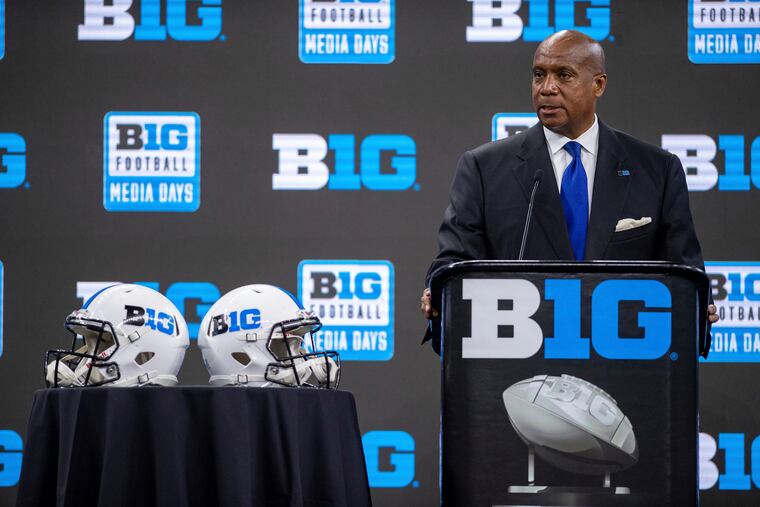Big Ten joins the ACC and the Pac-12 to work together to stabilize college athletics
The formation of the alliance among the three conferences comes less than a month after Texas and Oklahoma announced they would leave the Big 12 and join the SEC

In a response to last month’s surprising move of Texas and Oklahoma to the Southeastern Conference, the Big Ten, Atlantic Coast Conference, and Pac-12 announced Tuesday they have agreed to work together in what the leagues called “a collaborative approach surrounding the future evolution of college athletics and scheduling.”
In a 45-minute video conference with reporters, commissioners Kevin Warren of the Big Ten, Jim Phillips of the ACC and George Kliavkoff of the Pac-12 discussed a need for stabilize a volatile environment in college athletics. Including Penn State, the three conferences are represented by 41 teams.
“One of the things that we learned from COVID last year is that we live in uncertain times,” Warren said, “so I wouldn’t say this is a reaction to Texas and Oklahoma joining the SEC. But I think to be totally candid, you have to evaluate what’s going on in the landscape of college athletics.
“But with all the things that we are facing, which we’ve talked about on numerous occasions, and where we really are, this is a year for seismic shifts and I think it’s really important to make sure that you are aware of all these different things going on, that we do all we can to protect our individual conferences and build strong relationships.”
Phillips noted that the history of college athletics shows that “one expansion of a conference usually has led to another, to another, and to another.
“To the three of us, we felt the stabilization of the current environment across Division I and FBS and Power 5 in particular, was a chance for a new direction, a new initiative, that I don’t think has ever been done before, and felt that that was the most appropriate step at this current time.”
The conference alliance also has a scheduling component for football as well as men’s and women’s basketball designed to create new inter-conference games. Football games usually are scheduled well in advance, although Warren said the commissioners “have promised each other that we’re not going to interfere with any existing contracts that exist.”
Penn State’s nonconference schedule is complete through 2024, with home-and-home series versus Auburn in 2021 and 2022, and with West Virginia in 2023 and 2024.
However, the Big Ten and Pac-12 each play nine conference games while the ACC plays eight. It may take a while to get every league to the same number.
“We have a contractual commitment through the ends of our rights agreements to play nine conference games,” Kliavkoff said, “so to move to fewer games in sooner than three years, we’d need to have a partnership with ESPN and Fox to do that. I think there’s a compelling argument that the games that we could replace those with, if they were in the alliance, would be very compelling and worth making that move sooner.”
Kliavkoff also said there is no signed agreement among the three conferences, noting, “We didn’t even focus on that, didn’t even talk about that.”
The alliance also will discuss the proposal unveiled in June to expand the College Football Playoff from four games to 12. The commissioners of the other Power 5 schools, Greg Sankey of the SEC and Bob Bowlsby of the Big 12 – were among those who worked on the plan.
Warren and Kliavkoff said they support the expansion, but Phillips said the ACC hasn’t made a final decision.
The commissioners also said it is vital for the Big 12 to survive despite the eventual departure of its two most popular members. Texas and Oklahoma will be headed to the SEC no later than 2025.
“We want and need the Big 12 to do well,” Phillips said. “The Big 12 matters in college athletics. So I can just tell you that we’ll be watching what occurs here.
“This group in particular will be very interested to see what happens and to do everything that we can to try and make sure that college athletics looks similar to what it is today – the numbers of opportunities, the commitment to one another, the support of one another during really difficult moments, which we’re faced with right now.”